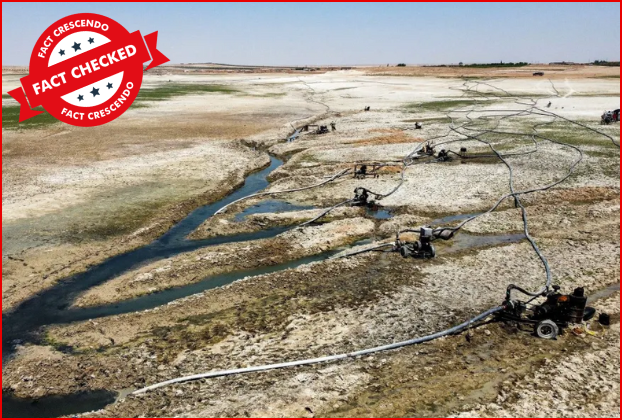The topic of the Euphrates River drying up, one of the most iconic rivers in the Middle East, has been a cause of main concern regionally and globally. It’s also been a popular topic among social media users, and some suggest that the river will be completely dried up, and finally, it will be the end of the world, as some bible prophecies say. What is the actual condition of the Euphrates River now, and what causes receding water levels? Let’s look at the viral claims first.
What does the post say
A video that has been viral among WhatsApp users in Sri Lanka talks about the Euphrates River drying up and how it’s linked to divine intervention.

We found the viral video via FB too.
The narrator quotes a couple of revelations from the Bible also to highlight his point and emphasizes that it was predicted that the Euphrates River would completely dry up and something supernatural would happen to herald the arrival of Judgment Day or the end of the world.
Significance of the Euphrates River for Western Asia
With a total length of 2800km, the Euphrates River is Western Asia’s longest river. The river headwaters are located in the southeast corner of Turkey. It then travels through Syria and Iraq before combining with the Tigris River to end up in the Persian Gulf. More can be read here. The Euphrates River was a vital waterway for the Mesopotamian civilizations, including the Sumerians, Babylonians, and Assyrians, who relied on the river for irrigation and transport of goods.
A considerable population uses this river for day-to-day activities, and it continues to be an essential water source for the region. However, the Mesopotamian Marshes are experiencing one of the world’s worst cases of increased desertification.
In 2019, Iraqi scientists stated that due to rising temperatures and declining rainfall between 1981-2016, the water bodies in the Mesopotamian Marshes were degrading and vast areas of natural vegetation were disappearing. Iraq has since endured consecutive years of droughts, and dams in neighbouring countries are impacting the Tigris and Euphrates water levels. The crisis is such that the Iraqi Ministry of Water Resources warns that the Euphrates River could be dry by 2040.
Religious significance and misleading references!
The Euphrates has religious significance to Christians and Muslims. Thus, religious opinions were significantly affected by spreading false propaganda. Let’s look at some of the religious references.
Revelation 16:12 from the Bible states: “The sixth angel poured his bowl on the great river Euphrates, and its water was dried up to prepare the way for the kings from the east.”
A Hadith from the Islamic texts also refers to the Euphrates and its supposed gold deposits: “The hour will not come to pass before the River Euphrates dries up to unveil the mountain of gold, for which people will fight. Ninety-nine out of one hundred will die, and every man amongst them will say: ‘Perhaps I may be the only one to remain alive.” More details about this can be read here
Based on those statements, misleading statements have risen.
Professor Hemathi Ranasinghe, a professor of environmental science attached to the Jayawardenepura University of Sri Lanka, explains, “Some people have argued that the drying up of the Euphrates River is a sign of divine punishment. This argument is based on the fact that the Euphrates River is mentioned in the Bible and the Quran as a symbol of fertility and abundance. Some people believe that the drying up of the river is a sign that God is angry with the people who live in the region.
“There is no evidence to support this claim. The drying up of the Euphrates River results from human activities, not divine punishment. It is important to remember that God’s anger does not cause natural disasters. They are simply the result of the natural world interacting with human activities.”, she further clarifies.
Reasons for the Euphrates River drying
- Regional conflict
Regional conflict is one of the significant issues. The Euphrates-Tigris basin is shared between Turkey, Syria, and Iraq, with Iran comprising parts of the Tigris basin. Since the 1960s, unilateral irrigation plans have altered the rivers’ flows, coupled with political tensions between the countries. The joint technical committee and the Government of Saudi Arabia act as conflict resolution facilitators in conflict countries. Memorandums of Understanding (MoUs) on water management were also signed between Iraq and Turkey and between Syria and Turkey in 2009. Moreover, the same year, Syria and Turkey jointly signed an agreement to build a dam. Both countries have primarily addressed water-sharing issues. However, many contracts and political parties were involved in sorting out regional issues associated with the river.
- ISIS involvement
In the course of its territorial expansion, Islamic State (IS, ISIL, or ISIS) has brought under its control strategically significant water resources and large parts of the water infrastructure in Syria and Iraq. It has seized several important dams on the Euphrates and Tigris as part of its expansion strategy and, mainly since 2014, has used water as a weapon in several ways. More details about this can be read here.
This practice is dangerous and virtually impossible for external actors to prevent it. The anti-IS coalition’s intensified military interventions since the Paris attacks put the militia under severe pressure. Should IS be forced into extensive withdrawals, whole regions will risk dramatic and widespread flooding.
- Hydrological power plants
The demand for energy, particularly for electricity, proliferates the social and economic development of Turkey and Iraq. The primary indigenous energy resources are limited to hydro, and several hydrological power plants were maintained using the Euphrates River. This table shows major dams, bounded countries, storage capacity, and hydropower generation.
| Name of dam | Country | Date of operation | Height (m) | Storage capacity (km3) | Water surface area (km2) | Hydropower (MW) |
| Ataturk | Turkey | 1992 | 166 | 48.7 | 817 | 2400 |
| Birecik | Turkey | 2000 | 53 | 1.22 | 56.3 | 672 |
| Karakaya | Turkey | 1987 | 158 | 9.58 | 268 | 1800 |
| Karkamis | Turkey | 1999 | 21 | 0.16 | 28.4 | 189 |
| Keban | Turkey | 1975 | 163 | 31 | 675 | 1330 |
| Baath | Syria | 1988 | ___ | 0.09 | 27.2 | 75 |
| Tabaqa | Syria | 1975 | 60 | 11.7 | 610 | 800 |
| Tishrine | Syria | 1999 | 40 | 1.9 | 166 | 630 |
| Upper Khabur | Syria | 1992 | ___ | 0.99 | 1.4 | ___ |
| Al Hindiyah | Iraq | 1913(1989) | ___ | ___ | ___ | ___ |
| Haditha | Iraq | 1988 | 57 | 8.2 | 503 | 660 |
| Fallujah | Iraq | 1985 | ___ | ___ | ___ | ___ |
| Ramadi-Habbaniyah | Iraq | 1956 | ___ | 3.3 | 426 | ___ |
| Ramadi Raazza | Iraq | 1951 | ___ | 26 | 1810 | ___ |
According to the available data, Iraq and Turkey are responsible for more hydropower than Syria. Ramadhi Rassa and Ataturk are at the top of hydropower generation. Together 14 hydropower plants are maintained using the Euphrates River. This is relatively high, which causes flooding risk during the rainy season.
Science Direct reveals that hydrological power plants cause water quality deterioration, water depletion downstream of the diversion, loss of longitudinal connectivity, habitat degradation, and simplifying the biota community composition.
· Climate Change Impacts
Iraq and the surrounding area also suffer from climate change and rising temperatures. This has been a problem for decades. Over the past decades, the flow in the Euphrates-Tigris River system has decreased to almost half of the average annual flow during dry years. The water levels in the Euphrates are currently at one of their lowest points in recorded history.
Center for Strategic and Information Studies (CSIS) reveals that Temperatures in northeastern Syria rose by one degree Celsius compared to 100 years ago, and average rainfall has decreased by 18 millimetres per month per century.
Water issues are arising with climate change. This is a massive problem in the agriculture sector. For example, farmers in Northeastern Syria lose their crops due to contaminated water and lack of irrigation. Historically, the Euphrates has met 85% of Syria’s agricultural demand for water since water contamination and droughts are significant problems.
Socio-economic and environmental issues with river drying
The drying of the Euphrates River has significant ecological and social implications for the regions it flows through. Professor Hemanthi Ranasinghe explains, “Water diversion: The Euphrates River is a transboundary river, which means that it flows through multiple countries. In recent years, upstream countries have been diverting more water from the river for agricultural and industrial use, which has reduced the amount of water available downstream.”
The drying of the Euphrates River has significant ecological and social implications for the regions it flows through. Let’s discuss some of the critical issues associated with that. As the river dries up, water scarcity becomes an urgent problem. This scarcity affects the availability of drinking water for local communities and their livelihood practices, animal husbandry, and hydropower generation. Decreasing water levels cause poor water quality and severe health issues. Famine and cholera are already famous in those areas, and there is a contamination risk also.
On the other hand, The drying of the river significantly reduces the water available for irrigation, leading to decreased crop yields and agricultural productivity, which results in food shortages, economic losses for farmers, and increased dependency on food imports.
“The Euphrates River is also heavily polluted, due to agricultural runoff, industrial waste, and sewage. This pollution is harming the river’s ecosystem and making it unsafe for human use.” Professor Hemanthi added.
The drying of the Euphrates River disrupts the natural ecosystems that depend on it—the riverine and river basin species. The decline in water levels can lead to habitat destruction, species loss, and a decrease in biodiversity. This disruption can have long-term ecological consequences, affecting the overall health of the region’s ecosystems.
The drying of the Euphrates River can contribute to social instability and population displacement. As water becomes scarce, conflicts may arise between different user groups, such as farmers, industrial sectors, and urban areas. Removal of communities due to water scarcity can result in increased migration, strained resources in the receiving regions, and potential social tensions.
Professor Hemanthi Ranasinghe concludes, “If these threats are not addressed, the Euphrates River could become extinct within the next few decades. This would have a devastating impact on the people and ecosystems that depend on the river. “
She also reveals that human activities, such as water diversion, pollution, and climate change, are the main threats to the Euphrates River. Any religious beliefs or practices do not cause these activities.
On a positive note, the Iraqi government has recognized the urgency of addressing water shortage challenges in the region and prioritizing the possible solutions, yet much more action is required to have any hope of bringing back areas once referred to as the ‘Garden of Eden’ anywhere closer to its former glory days.
Follow us and stay up to date with our latest fact checks.
Facebook | Twitter |Instagram | Google News | TikTok
Conclusion
We found that the viral video claiming the Euphrates River had completely dried up, and according to religious belief, it is the end of the world is misleading. While the fact that the Euphrates River is at risk of drying up is true, this has more to do with the adverse effects of climate change. Climate change induces prolonged droughts, rainfall, and temperature rise, directly affecting river drying.
However, several other factors, such as regional issues, hydrological plants, and ISIS involvement, also contributed to the rapid desertification of the Mesopotamian Marshes around the Euphrates River. Climate change mitigation measures, swift decision-making by the collective agreement between countries, and public awareness are needed to address this issue.

Title:Does the Euphrates River dry up lead to supernatural?
Written By: Fact Crescendo TeamResult: Missing Context






